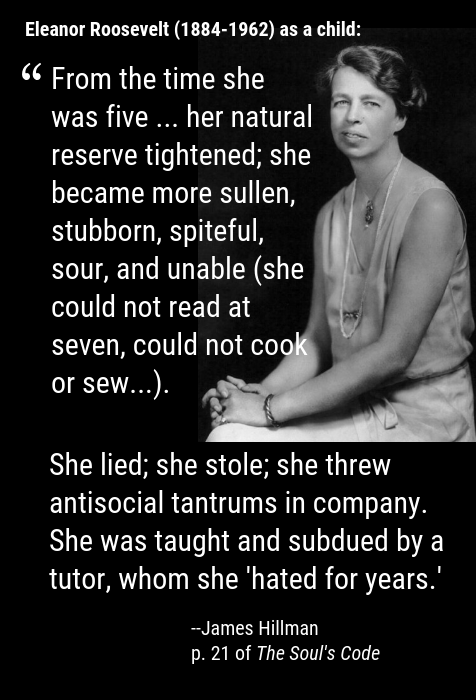
Have you ever noticed how a child’s symptoms, when viewed in retrospect, were an indication of his or her calling?
In the book The Soul’s Code, Hillman offers Eleanor Rooselvelt as one of many examples. She served as First Lady for 12 years during the Great Depression and WWII. Yet she said “I grew up with a fear of insanity.”
In addition to the difficult traits listed in the above quote, her nickname was Granny because she was old-fashioned. She lost both her parents before the age of 9. She described her childhood as a series of “gray days.”
What sustained her was a fantasy she indulged in for many years after her father died. She imagined she lived with her father, ran his household, and was his travel companion. “I carried on a day-by-day story, which was the realest thing in my life.”
In today’s culture symptoms usually mean something “bad.” So today Eleanor would be sent to therapy, given an IEP, and almost certainly prescribed medication. Her fantasies might be dismissed as compensation for her dreary childhood. Or viewed as bordering on delusion.
Hillman has a different take on her fantasies: “Their caring and managerial content was purposeful, preparation for the dutiful life she would later live. The fantasies were invented by her calling and were indeed more realistic in their orientation than her daily reality.”
“Imagination acted as teacher, giving instruction for the … tasks of caring for the welfare of a complex family, of a crippled husband, of the state of New York as the governor’s wife, the United States as its first lady, and even of the United Nations. Her fantasies of attending to ‘Father’ were a preliminary praxis into which she could put her call, her huge devotion to the welfare of others.”
When you exchange the word “abnormal” for “extraordinary” it offers a fresh perspective on our lives. And suggests that each child is a gifted child.
